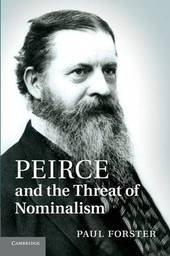
|
Peirce and the Threat of Nominalism
Paperback / softback
Main Details
| Title |
Peirce and the Threat of Nominalism
|
| Authors and Contributors |
By (author) Paul Forster
|
| Physical Properties |
| Format:Paperback / softback | | Pages:272 | | Dimensions(mm): Height 229,Width 152 |
|
| ISBN/Barcode |
9781107647633
|
| Classifications | Dewey:191 |
|---|
| Audience | | Professional & Vocational | |
|---|
| Illustrations |
2 Line drawings, unspecified
|
|
Publishing Details |
| Publisher |
Cambridge University Press
|
| Imprint |
Cambridge University Press
|
| Publication Date |
5 December 2013 |
| Publication Country |
United Kingdom
|
Description
Charles Peirce, the founder of pragmatism, was a thinker of extraordinary depth and range - he wrote on philosophy, mathematics, psychology, physics, logic, phenomenology, semiotics, religion and ethics - but his writings are difficult and fragmentary. This book provides a clear and comprehensive explanation of Peirce's thought. His philosophy is presented as a systematic response to 'nominalism', the philosophy which he most despised and which he regarded as the underpinning of the dominant philosophical worldview of his time. The book explains Peirce's challenge to nominalism as a theory of meaning and shows its implications for his views of knowledge, truth, the nature of reality, and ethics. It will be essential reading both for Peirce scholars and for those new to his work.
Author Biography
Paul Forster is Associate Professor in the Department of Philosophy at the University of Ottawa. He has published numerous papers and essays and is the co-editor of The Rule of Reason: The Philosophy of Charles S. Peirce (1997).
Reviews'Paul Forster's Peirce and the Threat of Nominalism is a clear and systematic introduction to a complex and sometimes intimidating thinker. It reveals the breadth and depth of Peirce's vision and helps make the case for regarding him as a philosopher of the first rank in the tradition of Euro-American philosophy.' Martin Coleman, Indiana University, Indianapolis 'If you are a contemporary realist in the analytic tradition, please read this book! Such a combination of difference (from accepted philosophical wisdom) and depth is rare, and whether you agree or disagree with the position argued for, it will challenge your thinking in productive ways.' Journal of the History of Philosophy
|